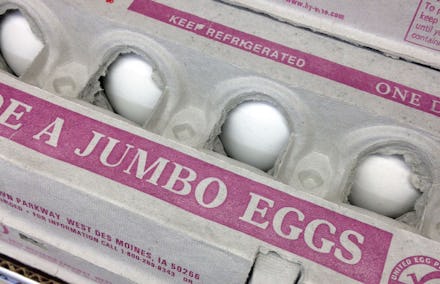Cage free, pasture raised, vegetarian: What are the most humane kind of eggs to buy?

Buying eggs is a tricky business. While many supermarkets are riddled with seemingly endless egg varieties — jumbo, super jumbo, cage free, all-natural, pasture raised, hormone free — even the packaged eggs marketed to look more humane are not necessarily so.
Wayne Hsiung, a lawyer and founding organizer for Direct Action Everywhere, an animal rights group, recently traveled to a cage-free egg farm, where he said he encountered cannibal hens, unhealthy, injured chickens and grim living conditions for the animals expected to lay eggs in personal spaces about the size of a standard sheet of paper. Sure, the chickens weren't in cages, but their living conditions were no better than if they were crammed into cages of a similarly puny size, Hsiung wrote in a contributed piece for the Huffington Post.
Egg carton labels might be meaningless
According to Certified Humane, labels like organic, natural and non-GMO can be misleading, as the USDA has no certifications on how much space or light an organically raised chicken needs. Similarly, chickens raised on vegetarian feed may be deprived of actual grass, as chickens are not naturally vegetarian and actually thrive off eating bugs and worms, the Washington Post reported.
It's also currently illegal to use hormones in any type of poultry, the Food and Drug Administration reports, so "hormone-free" means absolutely nothing special on your egg carton, as all legally sold eggs are free of added hormones. Even the word "humane" isn't USDA certified, so really any egg producer could print it on their packaging without many consequences.
So how can you tell which eggs are actually humane?
Of course, if you can visit the farm or site where eggs are laid (such as your own or a neighbor's backyard), you can verify that the chickens are living in appropriate conditions, but for those in urban areas, coordinating a coop visit may not be in the realm of grocery-shopping possibility.
When shopping, look for the Certified Humane seal on a package. It means that the nonprofit Humane Farm Animal Care (HFAC) has vouched for these producers and inspected the way that animals are treated and cared for. The group has created standards, including free-range hens having a minimum of two square feet of outdoor space per bird and pasture-raised hens having 108-square-feet each.
While Certified Humane Free-range and pasture-raised eggs are certainly the most humane, Adele Douglas, who has verified humane standards for the organization, wrote that cage-free eggs may be the best alternative to pasture-raised in some regions where year-round outdoor access for chickens is not possible. There are no actual space requirements for conventional cage-free hens, which is why factory farms can pack them in. Certified Humane mandates that for their humane status, "there must be 1.5 square feet per hen, litter for dust bathing, perches for the birds, and ammonia levels at a maximum of 10ppm, which means the scent is imperceptible."
From a health perspective, Dana Hunnes, a dietitian at UCLA's Fielding School of Public Health, said in an email that she would choose Certified Humane "cage-free organic whenever possible." And Hunnes isn't endorsing any of this egg white only stuff. "If you're going to eat an egg, eat the whole egg," she said. Not only will you need to use fewer eggs per serving but "there's no indication, medically speaking, that egg yolk is bad for health – it's in fact where all the healthy vitamins are."
While people were once told to avoid eating egg yolks due to the cholesterol, new research has shown that eating foods containing cholesterol, like eggs, do not lead to having higher cholesterol. The Mayo Clinic says that healthy people can eat up to seven whole eggs every week without raising their risk of heart disease.
Eggs are also high in vitamin E, protein and healthy fats, as well as relatively low in calories, so having an egg to start your day can easily help you crack open the key to a healthy breakfast.
Bottom line: The most humane eggs you'll eat are the ones from chickens allowed to roam and feed on their natural diets. Backyard chickens and free-range farm eggs are the most humane, but if you can't access these two types, Certified Humane cage-free eggs are your next best bet.